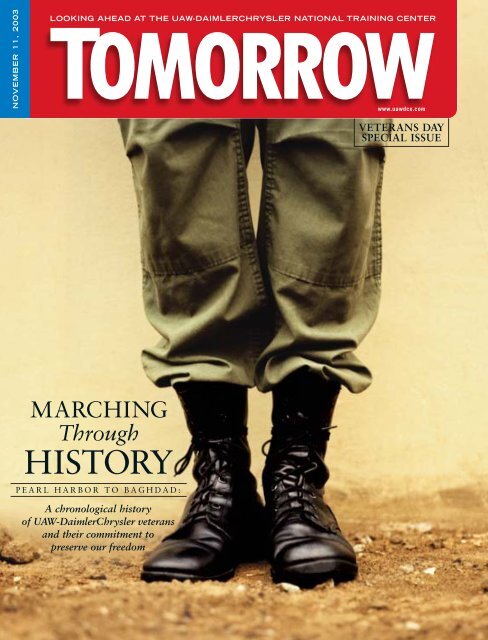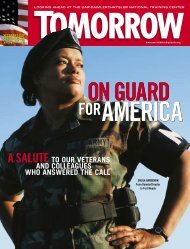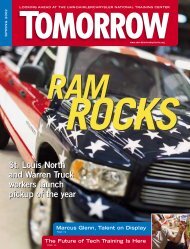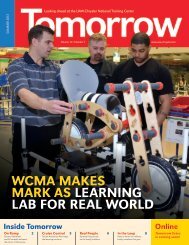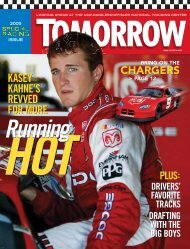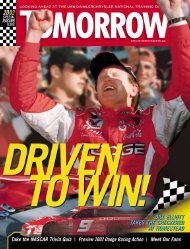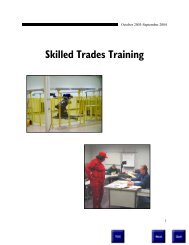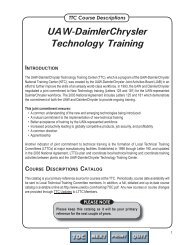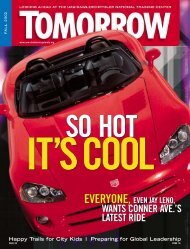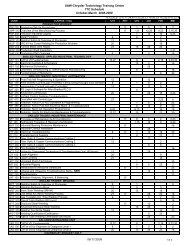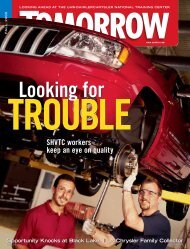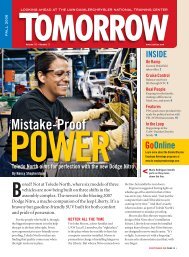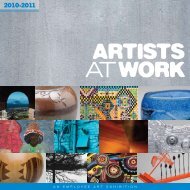Tomorrow Magazine Veterans Day Special Issue, 2003
Tomorrow Magazine Veterans Day Special Issue, 2003
Tomorrow Magazine Veterans Day Special Issue, 2003
You also want an ePaper? Increase the reach of your titles
YUMPU automatically turns print PDFs into web optimized ePapers that Google loves.
NOVEMBER 11, <strong>2003</strong><br />
LOOKING AHEAD AT THE UAW-DAIMLERCHRYSLER NATIONAL TRAINING CENTER<br />
www.uawdcx.com<br />
VETERANS DAY<br />
SPECIAL ISSUE<br />
MARCHING<br />
Through<br />
HISTORY<br />
PEARL HARBOR TO BAGHDAD:<br />
A chronological history<br />
of UAW-DaimlerChrysler veterans<br />
and their commitment to<br />
preserve our freedom
Side by Side<br />
Saluting Our <strong>Veterans</strong><br />
DaimlerChrysler Senior Vice<br />
President John Franciosi (left) and<br />
UAW Vice President Nate Gooden<br />
WE ARE PROUD TO ONCE AGAIN RECOGNIZE<br />
the heroes among us who defend our way of life<br />
through service in the U.S. armed forces. As we observe<br />
<strong>Veterans</strong> <strong>Day</strong> <strong>2003</strong>, our prayers are with reservists and<br />
members of the National Guard from DaimlerChrysler<br />
who remain in harm’s way in Iraq, Afghanistan and<br />
elsewhere. They carry on the patriotic tradition of<br />
employees who have fought in America’s previous wars<br />
and kept peace around the world.<br />
We thank the men and women honored in this<br />
<strong>Veterans</strong> <strong>Day</strong> <strong>Special</strong> <strong>Issue</strong> of <strong>Tomorrow</strong> and their<br />
coworkers who also have served our country. Their<br />
stories of sacrifice and courage should inspire everyone<br />
to support our veterans and freedom’s cause. Because of security concerns, we limited our<br />
profiles of citizen-soldiers participating in the war on terrorism to those who have completed<br />
their tours and returned to work.<br />
Our fifth annual tribute to veterans conveys a range of thought-provoking, deeply<br />
personal messages. Each of the 24 profiles is created in the veteran’s own words, as told<br />
to <strong>Tomorrow</strong> writers. This issue also has a different look than previous editions. The<br />
profiles of current or retired employees from the UAW and management are presented<br />
with a timeline that puts their service in historical perspective. The timeline tracks important<br />
political and military events, as well as milestones in the evolution of Chrysler and<br />
the UAW, from 1940 to the present.<br />
Each time we publish a <strong>Veterans</strong> <strong>Issue</strong>, we’re reminded that courage comes in many<br />
forms. Consider the Vietnam vet from a plant in the Midwest who told us his story. For<br />
13 months, he ran U.S. Army tank convoys across South Vietnam, leading a young<br />
platoon through death-filled battlefields and terror. He returned home with more<br />
medals than he’ll talk about, including a Bronze Star.<br />
But even now, a conversation about Vietnam causes him sleepless nights and anxious<br />
days. After sharing his combat experience, he had second thoughts and asked not to be<br />
profiled. He didn’t want to risk reliving his pain if coworkers were to ask him about the<br />
war after reading his story in <strong>Tomorrow</strong>. Of course, we respected his wishes.<br />
We owe this anonymous vet — and others with similar haunting wartime memories<br />
who shun recognition — special gratitude and support. Perhaps their greatest<br />
show of valor comes when they return home and move forward with their lives and<br />
their jobs, despite the sleepless nights. They are often the hidden heroes among us, and<br />
we salute them, too.<br />
UAW-DAIMLERCHRYSLER<br />
NATIONAL TRAINING CENTER<br />
2211 East Jefferson Avenue<br />
Detroit, MI 48207<br />
313.567.3300<br />
Fax: 313.567.4971<br />
E-mail: rrussell@ucntc.org<br />
www.uaw-daimlerchryslerntc.org<br />
JOINT ACTIVITIES BOARD<br />
NATE GOODEN<br />
VICE PRESIDENT, DIRECTOR<br />
DAIMLERCHRYSLER DEPARTMENT<br />
UAW, CO-CHAIRMAN<br />
JOHN S. FRANCIOSI<br />
SENIOR VICE PRESIDENT, EMPLOYEE<br />
RELATIONS DAIMLERCHRYSLER<br />
CO-CHAIRMAN<br />
DAVE MCALLISTER<br />
ADMINISTRATIVE ASSISTANT TO<br />
VICE PRESIDENT, DIRECTOR<br />
DAIMLERCHRYSLER DEPARTMENT UAW<br />
KEN MCCARTER<br />
VICE PRESIDENT, UNION RELATIONS AND<br />
SECURITY OPERATIONS DAIMLERCHRYSLER<br />
JAMES DAVIS<br />
CO-DIRECTOR UAW-DAIMLERCHRYSLER<br />
NATIONAL TRAINING CENTER<br />
FRANK L. SLAUGHTER<br />
CO-DIRECTOR UAW-DAIMLERCHRYSLER<br />
NATIONAL TRAINING CENTER<br />
RON RUSSELL<br />
COMMUNICATIONS ADMINISTRATOR<br />
BOB ERICKSON<br />
COMMUNICATIONS SPECIALIST<br />
TANISHA DAVIS-PEREZ<br />
STAFF WRITER<br />
MICHAEL BULLER<br />
EDITOR<br />
KAREN ENGLISH<br />
SENIOR EDITOR<br />
MEGHAN LITTLE<br />
MANAGING EDITOR<br />
SUSAN CASSIDY<br />
COPY EDITOR<br />
KRISTIN BRADETICH<br />
ART DIRECTOR<br />
CATHERINE KORN<br />
PRODUCTION MANAGER<br />
MARTY BUSS SMITH<br />
SENIOR ACCOUNT MANAGER<br />
Nate Gooden<br />
John Franciosi<br />
This magazine is printed by a union<br />
printer on union-made recycled paper.<br />
2 www.uawdcx.com
LOOKING AHEAD AT THE UAW-DAIMLERCHRYSLER NATIONAL TRAINING CENTER<br />
✮✮✮✮<br />
VETERANS DAY<br />
SPECIAL ISSUE<br />
www.uawdcx.com<br />
Volume 7 • Number 5<br />
<strong>Special</strong> <strong>Issue</strong>: <strong>Veterans</strong> <strong>Day</strong> <strong>2003</strong><br />
17<br />
9<br />
2 Side by Side<br />
Saluting our veterans.<br />
27 Strong Support<br />
Programs to help members<br />
of the Guard and Reserves make<br />
ends meet while on active duty.<br />
Back Cover<br />
Our fifth annual tribute recognizes<br />
all who served.<br />
Front Cover<br />
PHOTO BY KAREN BEARD/GETTY IMAGES<br />
Marching Through History page 4<br />
With the help of 24 veterans from DaimlerChrysler facilities,<br />
<strong>Tomorrow</strong> magazine presents a history of the defense<br />
of freedom since Pearl Harbor. In their own words, these<br />
veterans tell their stories of active duty. It’s a history of<br />
individual experiences, tied together with a timeline of<br />
significant events in national, automotive and UAW<br />
history. Read the stories of:<br />
Leon Bougeno, page 11<br />
George Bowman Jr., 25<br />
Adrian Collier, 19<br />
Nadine Craig, 22<br />
Carolyn Davis-<br />
Flanagan, 25<br />
Dean Delmain, 23<br />
Angela Donnellon, 20<br />
Mike Douglas, 24<br />
14 18<br />
George Farrell, 21<br />
Daniel J. Ferdinande, 25<br />
Tom Finch, 14<br />
Paul Hasenauer, 12<br />
Orville Hawes, 7<br />
Bonita Hobson, 18<br />
Cheryl Lamb, 16<br />
Melvin D. Lee, 15<br />
William “Tom” Lee Jr., 6<br />
Joe McMahon, 10<br />
Manuel Rodriguez<br />
Pacheco, 9<br />
Theodore E. Perry, 25<br />
Paul Pirro, 8<br />
Tony Sadowski, 24<br />
Reginald Sanders, 17<br />
Don Walton, 13<br />
THIS ISSUE ONLINE:<br />
Not Your Father’s Battlefield<br />
The technological face of combat has<br />
changed dramatically since World War II.<br />
Friends of the Family<br />
Sterling Stamping’s veterans help others<br />
in need.<br />
It’s No Summer Camp<br />
Two veterans recall their indoctrination into<br />
the military.<br />
Paying Tribute<br />
One man’s way of saying thanks.<br />
EXTRA<br />
www.uawdcx.com<br />
<strong>Tomorrow</strong> (ISSN: 1096-1429) is published quarterly with two special issues in spring and fall by Pohly & Partners, Inc., on behalf of the UAW-DaimlerChrysler National Training<br />
Center. Pohly & Partners, Inc., 27 Melcher Street, 2nd floor, Boston, MA 02210, 800.383.0888. Periodicals postage rates paid at Boston, Mass. and additional entry offices.<br />
POSTMASTER: Send address changes to <strong>Tomorrow</strong>, 2211 East Jefferson Ave., Detroit, MI 48207. © <strong>2003</strong> by UAW-DaimlerChrysler National Training Center.<br />
All rights reserved. Reproduction in whole or in part of any text, photograph or illustration without prior written permission from the publisher is strictly prohibited.
Marching<br />
Through<br />
H<br />
JAY BAKER<br />
4 www.uawdcx.com
REBECCA COOK<br />
Dean Delmain at the <strong>Veterans</strong><br />
Memorial Walk in St. Louis.<br />
See Delmain’s story on page 23.<br />
istory<br />
CChallenges to freedom are nothing new.<br />
Throughout history, this nation has confronted<br />
perils both within and beyond our borders. Those<br />
threats may have changed over time, but one thing<br />
that never wavers is the steadfast readiness of the<br />
men and women of the armed forces to protect our<br />
country’s interests and its citizens.<br />
Among the ranks of those who have answered the<br />
call through the years are many DaimlerChrysler<br />
workers. In this special issue, you’ll meet some<br />
coworkers who are veterans of conflicts that<br />
changed history, stretching TIMELINE, 1940–<strong>2003</strong><br />
from World War II to today’s<br />
confrontations in the Middle Political and<br />
Military Events<br />
East. Through their stories,<br />
told in their own words, we UAW and Daimlerhonor<br />
all who have served. Chrysler Milestones<br />
▲<br />
▲<br />
▲<br />
▲<br />
▲<br />
▲<br />
TOMORROW VETERANS DAY <strong>2003</strong> 5
You had to keep order and do everything on the double.<br />
WWilliam “Tom” Lee Jr. as told to<br />
Molly Rose Teuke<br />
When I enlisted in the Marines in<br />
1943, I explained that I’d just gotten<br />
married, but I was called up anyway.<br />
I didn’t like leaving, but at 18, you<br />
figure it’ll just be for a little while. I<br />
did not go overseas. When I was in<br />
San Diego, about half the platoon<br />
went overseas right after boot camp.<br />
There were a couple of times that<br />
we were all dressed in our greens with<br />
our sea bags packed, standing at the<br />
foot of our bunks in the barracks,<br />
waiting for orders to board ships. A<br />
couple dozen names would be called<br />
out to report for further training, and<br />
my name was among those. It was the<br />
same at Cherry Point, N.C.<br />
William “Tom” Lee Jr.<br />
U.S. Marine Corps, 1943–1945<br />
Corporal<br />
Product Design Leader, Transmission<br />
DaimlerChrysler Technology Center<br />
UAW Local 412<br />
6 www.uawdcx.com
OPPOSITE PAGE: JOHN SOBCZAK/LORIEN STUDIOS<br />
We’d march all day with our<br />
rifles. We learned to take our rifles<br />
and machine guns apart blindfolded<br />
and put them back together. We got<br />
training in things like recognizing<br />
planes and SOS signaling — part of<br />
it was keeping track of the aircraft.<br />
It was training for overseas duty.<br />
I kept records on all the planes at<br />
the base and the hours they flew, so<br />
that pilots didn’t take planes up that<br />
were in need of service. You know<br />
you’ve got a job with a lot of responsibility.<br />
I learned to be a detail<br />
person. You had to keep order and<br />
do everything on the double.<br />
I didn’t find it hard, but I was<br />
more interested in getting back to<br />
see my bride. When you lie in bed<br />
at night and you hear taps, there’s<br />
a lonesomeness.<br />
I considered it an honor and privilege<br />
to serve in the armed forces. I<br />
was proud to have been a part of it. ✮<br />
Tom Lee was honored by his<br />
coworkers with a plaque that reads:<br />
On behalf of the UAW Local 412<br />
<strong>Veterans</strong> Committee we salute you<br />
for honorably serving our grateful<br />
nation during WWII. We commend<br />
you for your dedication and service<br />
and make you an honorary member<br />
of the veterans committee. Given on<br />
this day, June 11, <strong>2003</strong>.<br />
Orville Hawes<br />
U.S. Army 43rd Infantry Division, 1941–1948<br />
Drill Sergeant/Staff Sergeant<br />
St. Louis South Assembly<br />
President, UAW Local 136 (retired)<br />
IOrville Hawes as told to Martha K. Baker<br />
I was drafted from home [Kentucky] and took my Army basic training<br />
at Camp Croft in South Carolina. In January 1942, I shipped overseas.<br />
The Army sent my regiment to an island in the South Pacific, and, you<br />
aren’t going to believe this, but I spent the war on beautiful Bora Bora.<br />
The Japanese were moving in, so the Army wanted to fortify the<br />
islands in the South Pacific. Thousands of soldiers made the island a<br />
fort. We built roads and airfields and the like. That work was all new to<br />
me, but you had to get used to new stuff in the Army. I’d worked as a<br />
coal miner before, and my father had worked as a coal miner. I was<br />
lucky I got drafted because it got me out of the mines. I wasn’t allowed<br />
to tell my family any more than<br />
“I’m in the South Pacific.” I’m sure<br />
they were worried about me.<br />
I can’t complain about my service.<br />
I saw a part of the world I never<br />
would have seen otherwise, a part<br />
of the world that [James] Michener,<br />
the famous writer, called “the most<br />
beautiful island in the world.”<br />
After I was discharged in 1945, I<br />
reenlisted. At Fort Hood [Texas], I<br />
I’m sure<br />
they were<br />
worried<br />
about me.<br />
was a drill sergeant with the 2nd Armored Division. I liked the Army and<br />
thought of making it a career, but after the war, I saw a different Army. I<br />
was disillusioned, so I left in ’48. I went to Evansville, Ind., about 60<br />
miles from where I was raised, to get a job at Chrysler.<br />
✮<br />
Editor’s Note: Orville Hawes declined to be photographed.<br />
TIMELINE, 1940–<strong>2003</strong><br />
1940 1941<br />
September 1940. Ground broken for Detroit Arsenal Tank Plant in Warren<br />
Township, Mich. Chrysler built tanks in this first and largest of America’s<br />
defense plants, turning out 22,234 between 1941 and 1945.<br />
WWII<br />
July 1941. Willys-Overland starts<br />
turning out jeeps, an average of one<br />
every two minutes.<br />
Dec. 7, 1941. Japanese attack Pearl Harbor.<br />
President Franklin D. Roosevelt declares war on<br />
Japan, and all civilian car production halts.<br />
Dec. 12, 1941. UAW International Board<br />
pledges that the union will call no strikes<br />
for the duration of the war.<br />
TOMORROW VETERANS DAY <strong>2003</strong> 7
WWII<br />
➤ 16,354,000 Americans in<br />
military service<br />
➤ 291,557 killed in action<br />
➤ 110,000+ POWs<br />
Paul Pirro<br />
U.S. Army, 1943–1945<br />
Private<br />
U.S. Army Reserve, 1950–1953<br />
Corporal<br />
Machine Operator<br />
New Process Gear (retired)<br />
UAW Local 624<br />
I’m lucky that I’m here.<br />
Paul Pirro as told<br />
Oto Molly Rose Teuke<br />
On June 6, 1944, we invaded France at<br />
Omaha Beach. We landed at 6:30 a.m.<br />
Our outfit [299th Combat Engineer<br />
Battalion] lost 30 percent of our men<br />
right on the beach, from the German<br />
artillery shells. I’m lucky that I’m here.<br />
Our job on the beach was to blow up<br />
obstacles with TNT and to pick up<br />
mines, all under fire. That was a dangerous<br />
job.<br />
I went back there in March 1972.<br />
The American Cemetery is on top of<br />
the hill. There is a chapel, then steps<br />
going down to Omaha Beach and<br />
Utah Beach. The first thing I did was<br />
kiss the sand. I told my wife that I<br />
never thought I’d be back there. Some<br />
of the concrete German pillboxes had<br />
been kept there as memorials. The<br />
Germans had been in there with<br />
machine guns, and when our ships<br />
started coming in, they were shooting<br />
at us. That’s a day that I’ll never forget.<br />
I was also in the Battle of the Bulge,<br />
in the Bastogne area. The American<br />
troops there were cornered on Dec. 16,<br />
1944, by the Germans. The battle went<br />
on for quite a while, and the 82nd<br />
Airborne and 101st Airborne had to<br />
drop supplies to us. I have five battle<br />
stars, one for every heavy battle that I<br />
was in. I was 18 1/2 years old when<br />
I entered the Army. The president gave<br />
a unit citation to the whole battalion.<br />
When Saving Private Ryan came<br />
out, reporters from a local TV station<br />
came to my house to show me the<br />
tape. The filmmakers didn’t get it exactly<br />
right, but it’s only a movie, and I<br />
only saw five minutes of it. I had tears<br />
in my eyes and they turned off the tape<br />
out of respect. I lost some pretty good<br />
buddies of mine on the beach. ✮<br />
WWII cont.<br />
June 7, 1942. Battle of Midway ends<br />
in a U.S. victory, blocking Japanese<br />
eastward expansion in the Pacific.<br />
Early 1942. Chrysler switches to war production, including tanks,<br />
engines for B-29 Superfortress aircraft, marine engines, ammunition,<br />
and boats and trucks for military use. Chrysler also makes<br />
nickel-plated diffusers for the Oak Ridge atomic laboratory.<br />
June 25, 1942. General Dwight<br />
D. Eisenhower assumes command<br />
of U.S. forces in Europe<br />
Aug. 7, 1942. U.S. 1st<br />
Marine Division lands<br />
on Guadacanal.<br />
1942 1943<br />
March 31, 1942. UAW President Walter<br />
Reuther pushes his plan to increase production<br />
of military aircraft to 100 planes a day.<br />
He serves on several national wartime boards.<br />
November 1942. The<br />
UAW opens an office in<br />
Washington, D.C.<br />
Feb. 2, 1943. German<br />
troops accept defeat<br />
at Stalingrad.<br />
8 www.uawdcx.com
THIS PAGE: DAVID DEAL, OPPOSITE PAGE: MICHAEL GREENLAR<br />
HULTON-DEUTSCH COLLECTION/CORBIS<br />
We were under fire<br />
most of the time.<br />
I<br />
Manuel Rodriguez Pacheco as told<br />
to S.C. Biemesderfer<br />
I was young, in my early 20s, when I<br />
joined the Army in 1951. After training<br />
us, they put my rifle company on<br />
a boat to Korea. I was in the 3rd<br />
Division, 65th Infantry Regiment.<br />
They sent us to the front lines,<br />
where I worked as a lineman. Every<br />
time our company advanced, it was<br />
my job to connect the telephone line<br />
from the rear of the artillery to the<br />
command post.<br />
The time it was the worst, I’ll never<br />
forget. It had been raining for two days<br />
and enemy fire was coming from<br />
everywhere. They had done a lot of<br />
damage and blown all our wires to<br />
pieces. But without the line to the command<br />
post, more people would die.<br />
I volunteered with a buddy to try to<br />
put the line back together. We had to<br />
slide around in the rice paddies for a<br />
long way. There was artillery and mortar<br />
fire all around us. We were covered<br />
in mud, so much that I could barely see,<br />
and there were pieces of wire all over<br />
the place. Looking back, I don’t know<br />
what I was thinking. But somehow, I<br />
put the right pieces of line together.<br />
My lieutenant recommended me<br />
for medals, but I never received<br />
WWII cont.<br />
July 10, 1943.<br />
Allies invade Sicily.<br />
June 5, 1944.<br />
U.S. troops enter<br />
Rome, first Axis<br />
capital to fall.<br />
1944<br />
June 6, 1944.<br />
Allied forces land<br />
at Normandy,<br />
France.<br />
January and February 1944. UAW opens the<br />
first labor bookstore in Detroit and convenes its<br />
first annual education conference.<br />
Manuel Rodriguez Pacheco<br />
U.S. Army, 1951–1953<br />
Private First Class<br />
Metal Finisher<br />
Newark Assembly (retired)<br />
UAW Local 1183<br />
them. My kids came across my Army<br />
papers and old newspaper clippings<br />
and worked with our UAW <strong>Veterans</strong><br />
Committee to have the medals<br />
awarded. That was a very proud day<br />
for me. The American flag is the<br />
most beautiful flag in the world. It<br />
was my honor to defend it.<br />
✮<br />
July 21, 1944.<br />
U.S. forces<br />
land on Guam.<br />
Aug. 25, 1944.<br />
Paris is liberated.<br />
Last February, Pacheco was awarded<br />
the U.N. Service Medal, Korean<br />
Service Medal (two Battle Stars),<br />
National Defense Medal and Combat<br />
Infantry Medal. Three of his<br />
children, Richard and Marie Pacheco<br />
and Teresa Chance, work at<br />
Newark Assembly.<br />
Oct. 26, 1944. U.S.<br />
Pacific Fleet wins<br />
Battle of Leyte<br />
Gulf, Philippines.<br />
Nov. 7, 1944.<br />
President Roosevelt<br />
elected to unprecedented<br />
fourth term.<br />
TOMORROW VETERANS DAY <strong>2003</strong> 9
I always<br />
felt something<br />
about that<br />
memorial<br />
was missing.<br />
KOREA<br />
➤ 1,789,000 Americans in<br />
military service<br />
➤ 33,667 killed in action<br />
➤ 7,666 POWs/MIA (presumed dead)<br />
I<br />
Joe McMahon as told<br />
to Martha K. Baker<br />
I was one of the first to go in to Korea<br />
with 1,894 people in the 34th Infantry<br />
Regiment of the 24th Division, in 1950.<br />
In seven weeks, we were down to 194<br />
of those original soldiers. The first man<br />
killed in combat, Kenneth Shadrick,<br />
was from our outfit. [The North<br />
Koreans] overwhelmed us in three<br />
hours’ time — we were under-strength,<br />
under-equipped, under-trained.<br />
People died in the Korean War. So<br />
to me the Korean War monument in<br />
Forest Park [St. Louis] never seemed to<br />
Joe McMahon<br />
U.S. Army 1948–1952<br />
Staff Sergeant<br />
Millwright<br />
St. Louis South Assembly and<br />
St. Louis North Assembly (retired)<br />
UAW Local 136<br />
be enough. I always felt something<br />
about that memorial was missing.<br />
Although several names of people<br />
killed were embedded in the monument<br />
for posterity, no one could see them.<br />
So I joined a committee of about<br />
12 vets from four local chapters of<br />
the Korean War <strong>Veterans</strong> Association<br />
to figure out what we wanted.<br />
We worked for three years to raise<br />
$13,500 for two new pedestals. We<br />
held fundraisers twice a year and<br />
sold the blue Rose of Sharon, the<br />
national flower of South Korea, and<br />
we took donations.<br />
On Aug. 2, <strong>2003</strong>, the day before<br />
the 50th anniversary of the signing of<br />
the Korean Armistice Agreement, we<br />
held a memorial service. About 400<br />
people gathered around the Korean<br />
War Memorial, a large stainless-steel<br />
sundial next to the Jewel Box [an Art<br />
Deco greenhouse]. Our two black<br />
granite pedestals stand on either side<br />
of five flags representing America,<br />
prisoners of war, the United Nations,<br />
South Korea and Missouri. One<br />
pedestal is inscribed “Freedom is<br />
never free,” and on the other is a map<br />
of the Korean peninsula marked with<br />
the 38th parallel and four major cities.<br />
Inscribed on the black granite of<br />
the pedestals are the names of the<br />
28 fallen soldiers from Jefferson<br />
County, St. Louis County and city,<br />
and St. Charles County.<br />
✮<br />
Dec. 27, 1944.<br />
Allies victorious in<br />
Battle of the Bulge.<br />
Feb. 7, 1945. Sen.<br />
Joseph R. McCarthy<br />
of Wisconsin claims<br />
the U.S. State Dept.<br />
harbors communists.<br />
WWII cont.<br />
Feb. 23, 1945.<br />
U.S. Marines raise<br />
flag at Iwo Jima.<br />
May 7, 1945. Germany surrenders;<br />
President Truman<br />
proclaims May 8 V-E<br />
(Victory in Europe) <strong>Day</strong>.<br />
Aug. 15, 1945.<br />
Korea is divided along<br />
the 38th parallel into<br />
U.S. and Soviet zones.<br />
Sept. 2, 1945.<br />
Japan signs<br />
surrender<br />
agreement.<br />
1944 1945 1946<br />
1946. Chrysler resumes commercial vehicle production, producing<br />
slightly modified prewar models. New sedan, coupe and<br />
convertible versions of the Chrysler Town & Country are introduced.<br />
BETTMANN/CORBIS<br />
10 www.uawdcx.com
OPPOSITE PAGE AND THIS PAGE: JAY BAKER<br />
Leon Bougeno<br />
U.S. Army, 1953–1955<br />
Private First Class<br />
Metal Finisher<br />
St. Louis South Assembly (retired)<br />
UAW Local 136<br />
I was supporting my four brothers<br />
and sisters when I was drafted.<br />
MLeon Bougeno as told<br />
to Martha K. Baker<br />
My father died in 1950, and I was<br />
supporting my four brothers and sisters<br />
when I was drafted and sent to<br />
Fort Gordon, Ga., after basic training.<br />
I sent my whole paycheck from the<br />
Army home to Evansville, Ind. I<br />
worked three jobs to support myself. I<br />
drove a staff car for General Truman<br />
(not the Truman) and General Bolen<br />
in the morning, then I’d sleep in the car<br />
unless he had to go somewhere. I ran a<br />
skating rink until 11 p.m., and after<br />
that, I ran a gas station until 6 a.m. I’d<br />
leave there and go to the base to clean<br />
up and report to the motor pool.<br />
I got the driving job even though I<br />
was with the 101st Airborne and<br />
wearing a Class A uniform. The sergeant<br />
who was supposed to drive the<br />
general showed up with alcohol on<br />
his breath, so General Truman said,<br />
“Get the first man you see ready to<br />
go.” Someone pointed to me.<br />
“I thought you were supposed to<br />
be a corporal or better to drive a general,”<br />
I told General Truman (I was<br />
bucking for a pay raise).<br />
“Don’t you think I have enough<br />
rank to overrule that?” he asked (I<br />
didn’t get the raise).<br />
The Korean War was over shortly<br />
after I was drafted. They heard I was<br />
coming so they gave up. We were<br />
fighting a war we couldn’t win — a<br />
lost cause. When I got home, I tried<br />
to join the VFW, but they wouldn’t<br />
accept me because I hadn’t stepped a<br />
toe in Korea — even though I was in<br />
the Army during the war. I had nothing<br />
to do with where I was sent. ✮<br />
April 1948. Unknown assailants attempt<br />
to assassinate UAW President Walter<br />
Reuther, seriously wounding him.<br />
Korea<br />
1948 1949 1950<br />
September 1949. UAW<br />
negotiates auto industry’s<br />
first pension plan.<br />
June 25, 1950.<br />
North Korea invades<br />
South Korea.<br />
1950. Chrysler introduces<br />
four-wheel disc brakes.<br />
June 27, 1950.<br />
U.N. asks members<br />
to intervene.<br />
TOMORROW VETERANS DAY <strong>2003</strong> 11
As my confidence grew, I risked more.<br />
W<br />
Paul Hasenauer as told<br />
to Molly Rose Teuke<br />
When I was a boy I had a fear of<br />
heights. By the time I first enlisted, in<br />
1980, I could climb a ladder. But I<br />
wasn’t going to be airborne — that<br />
was for people bigger and better than<br />
me. Then a ranger friend of mine said,<br />
“Paul, it’s not wrong to be afraid; it’s<br />
wrong when you let your fears stop<br />
you from what you know you need to<br />
do.” So many times in my life, I’ve<br />
thought about that.<br />
I gradually gravitated toward<br />
more specialized units, and trained<br />
in jungle school, <strong>Special</strong> Forces survival<br />
school, and some things I’d<br />
rather not disclose. As my confidence<br />
grew, I risked more.<br />
When it comes to heights, there’s a<br />
psychological point, and that’s 33 feet.<br />
If you can do it at 33 feet, you can do<br />
anything. Eventually, you get up there<br />
and then you’re not afraid anymore.<br />
I had an association with <strong>Special</strong><br />
Forces. I served in Korea at Panmunjom,<br />
the 38th parallel. Our mission<br />
was to protect the DMZ [demilitarized<br />
zone]. Officially, we were a joint<br />
security force under the United<br />
Nations Military Armistice Command.<br />
In order to get into a real-world mission<br />
at that time, you had to keep volunteering<br />
and moving up. The Army<br />
said to me, “Kid, we can’t do it for<br />
you, but we can do it with you.” ✮<br />
June 30, 1950. President<br />
Truman orders ground forces<br />
into Korea and sends Air<br />
Force to bomb North Korea.<br />
1950–1954. Chrysler produces 28,878 tanks for the war effort,<br />
unveiling the M-48 “Patton” tank in 1952 at the tank plant in<br />
Newark, Del. Chrysler also produces trucks, aircraft and missile<br />
components, and other items for the Korean War effort.<br />
Paul Hasenauer,<br />
U.S. Army, 1980–1986<br />
Sergeant<br />
Mechanic/Driver, 3rd Shift Union Steward<br />
Arizona Proving Grounds<br />
UAW Local 509<br />
Sept. 27, 1950.<br />
U.S. establishes a Military Assistance<br />
Advisory Group in South Vietnam<br />
to support the French.<br />
Korea cont.<br />
1951<br />
1951. Chrysler<br />
unveils the HEMI<br />
V8 engine.<br />
April 11, 1951. General<br />
Douglas MacArthur recalled<br />
from Korea.<br />
July 1951. International UAW<br />
opens new headquarters at<br />
Detroit’s Solidarity House.<br />
MICHAEL MERTZ<br />
12 www.uawdcx.com
JOHN SOBCZAK/LORIEN STUDIOS<br />
We ended up in<br />
all the hot spots.<br />
I<br />
Don Walton as told<br />
to S.C. Biemesderfer<br />
I have more than 34 years with the<br />
company. It was a long time ago when<br />
I served, but it’s still very clear to me.<br />
I enlisted in the Marines in April<br />
1966. The recruiters promised to<br />
enroll me in heavy equipment school.<br />
That was the plan, anyway. Within<br />
six months, instead of heavy equipment<br />
school, I found myself with a<br />
heavy pack, a heavy rifle and a heavy<br />
helmet on a rice paddy in Vietnam.<br />
I was a sergeant and served with the<br />
1st Battalion, 3rd Marines, 3rd Marine<br />
Division, Charlie Company. The first<br />
place they put us was the DMZ [demilitarized<br />
zone]. After about six months,<br />
they started sending our unit all over<br />
I-Corps, which was the northernmost<br />
territory occupied by our forces. They<br />
would brief us and drop us wherever<br />
they needed us to go in and fight. We<br />
ended up in all the hot spots, running<br />
missions they gave us. It was heavy<br />
fire, heavy combat, heavy casualties.<br />
I spent 13 months in country. I<br />
came home with six medals, including<br />
the Presidential Unit Citation, Good<br />
Conduct Medal,Vietnamese Campaign<br />
Don Walton<br />
U.S. Marines, 1966–1969<br />
Sergeant<br />
Inspector<br />
Toledo Machining<br />
UAW Local 1435<br />
Ribbon with two stars and Vietnamese<br />
Appreciation Ribbon.<br />
I was shot through my pack once,<br />
but I was never really injured. I count<br />
myself as very lucky. So many men lost<br />
their lives, and still some POW and<br />
MIA soldiers haven’t been accounted<br />
for. I fly a POW/MIA flag in my yard<br />
and have a Marine Corps tattoo on my<br />
arm. It’s important not to forget. ✮<br />
VIETNAM<br />
➤ 2 million Americans in<br />
military service<br />
➤ 47,244 killed in action<br />
➤ 2,400 POWs/MIA<br />
Jan. 20, 1953. President<br />
Eisenhower increases U.S.<br />
aid to the French in Vietnam,<br />
citing the “domino theory.”<br />
July 27, 1953. Armistice<br />
signed, officially creating<br />
communist North Korea and<br />
democratic South Korea.<br />
May 7, 1954. French surrender<br />
their fort at Dien Bien Phu,<br />
prompting French withdrawal<br />
from Vietnam after eight years<br />
of occupation.<br />
1953 1954 1955 1959<br />
1953. The innovative<br />
PowerFlite two-gear<br />
automatic transmission<br />
premieres at Chrysler.<br />
Vietnam<br />
January 1955.<br />
First direct shipment<br />
of U.S. military aid<br />
arrives in Saigon.<br />
March 1959. Ho Chi Minh<br />
declares a People’s War to<br />
unite Vietnam. Two months<br />
later, construction of Ho Chi<br />
Minh Trail begins.<br />
1955. A Chrysler C-300 wins a NASCAR<br />
Grand National race for the first time with<br />
an average speed of 92 mph. The team<br />
wins 20 out of 40 NASCAR races.<br />
TOMORROW VETERANS DAY <strong>2003</strong> 13
[We] used to talk about the food we missed the most.<br />
For me, it was always the cheeseburger.<br />
W<br />
Tom<br />
Finch as told<br />
to S.C. Biemesderfer<br />
When the Army drafted me in 1967,<br />
I was 20 years old and living in Clare,<br />
Mich. By June of 1968, I was in<br />
Vietnam. I was a sergeant assigned to<br />
the 4th Infantry Division in Dak To,<br />
November 1960. Ho Chi Minh’s<br />
guerrillas, called Viet Cong,<br />
infiltrate the countryside. Hanoi<br />
establishes National Liberation<br />
Front as its political organization.<br />
near what they called the tri-border of<br />
Vietnam, Laos and Cambodia. There<br />
was a lot of intense fighting.<br />
Just to distract ourselves, my buddies<br />
and I used to talk about the food<br />
we missed the most. For me, it was<br />
always the cheeseburger. In fact, when<br />
I got five days of R&R in Hawaii, the<br />
Tom Finch<br />
U.S. Army, 1967–1969<br />
Michigan National Guard, 1977–1979<br />
Alabama National Guard, 1982–1996<br />
U.S. Army Reserve, 1996–present<br />
Staff Sergeant<br />
Production Line Worker<br />
Huntsville Electronics (retired)<br />
UAW Local 1413<br />
May 1961. President<br />
Kennedy sends Green<br />
Berets to South Vietnam.<br />
Vietnam cont.<br />
1960 1961 1964<br />
April 27, 1961. In a speech on the occasion of<br />
the 25th anniversary of the UAW, Dr. Martin<br />
Luther King Jr. compares sit-down strikes of<br />
the 1930s to civil rights sit-ins.<br />
first thing I did — after finding my<br />
wife — was get a cheeseburger.<br />
After two years of active duty, I<br />
went home to Michigan and worked<br />
at Chrysler’s INTROL electronics<br />
division in Ann Arbor. In 1977, I<br />
joined the Michigan National Guard.<br />
When they closed the Ann Arbor<br />
plant in 1982, I took a job on the production<br />
line at Huntsville Electronics.<br />
I retired last year after 30 years.<br />
After moving to Alabama, I joined<br />
the Alabama National Guard. Then I<br />
switched to the Army Reserve in 1996<br />
so that I could have more promotion<br />
opportunities. I’m a staff sergeant<br />
now. The last time I got called to<br />
active duty was this fall, for three<br />
weeks at Fort McClellan in Alabama.<br />
I worked in operations and helped set<br />
up classes at the signal school.<br />
I realize now how young we were<br />
when we fought in Vietnam. A lot of<br />
the people we send to fight are barely<br />
20 years old. When you’re older, you<br />
realize how young that is.<br />
✮<br />
Tom Finch and his unit received many<br />
honors, including two Presidential<br />
Unit Citations, the Vietnamese Service<br />
Medal, the Vietnam Campaign Medal<br />
and the Cross of Gallantry.<br />
August 1964. Congress passes the Gulf of Tonkin<br />
Resolution authorizing the president to take “all<br />
necessary steps” to prevent attacks on U.S. forces.<br />
1964. First<br />
model year for<br />
Plymouth<br />
Barracuda.<br />
December 1964. UAW organizes<br />
airlift of food and medicine to<br />
South Vietnamese children.<br />
FLIP SCHULKE/CORBIS<br />
14 www.uawdcx.com
OPPOSITE PAGE: MARC BONDARENKO, THIS PAGE: BILL SCHWAB<br />
We were<br />
pushing for<br />
diversity.<br />
I<br />
Melvin D. Lee as told<br />
to Molly Rose Teuke<br />
I had been called up four or five<br />
times, but I had a deferment for<br />
school, so I didn’t go. Finally, I volunteered,<br />
and on June 5, 1967, I joined<br />
the Army. I was just shy of 21, and I<br />
wanted to do my duty for my country<br />
and get back to living my life.<br />
I was assigned to the personnel<br />
department of the 1st Maintenance<br />
Battalion in Mannheim, Germany. My<br />
duties were to process new people<br />
joining us and departures from<br />
Germany, either to Vietnam or home.<br />
Being assigned to personnel, I was<br />
selected for various special assignments.<br />
I was assigned to a regional<br />
race relations committee. Years<br />
before we got there, a race riot broke<br />
out in Germany at Spinelli Barracks.<br />
It was the first time, that I know of,<br />
this kind of committee was even<br />
attempted in Germany. We were<br />
pushing for diversity, to make sure<br />
everybody got equal treatment. I was<br />
in Germany for two years doing that,<br />
not enough time to see what the<br />
Melvin D. Lee<br />
U.S. Army, 1967–1970<br />
<strong>Special</strong>ist Fifth Class<br />
Financial Analyst, Mopar<br />
Center Line Parts Distribution Center<br />
impact was. We were just the nucleus<br />
to get it started.<br />
The military gives you an awakening,<br />
makes you more aware of what<br />
you have to do to plan for the future.<br />
It made me able to look at things<br />
from different points of view; it<br />
broadened my outlook on life. It<br />
makes you think, that’s the main<br />
thing. I tried to look down the road<br />
20 years and make a determination<br />
— where did I want to be? I knew I<br />
needed an education to provide for a<br />
lifestyle that would be healthy, selfsatisfying,<br />
rewarding and economically<br />
fulfilling.<br />
Military life added a certain discipline<br />
and made me aware of choices.<br />
But most of all, it redefined the<br />
buddy system and teamwork. In retrospect,<br />
it was one of the best things<br />
that happened to me.<br />
✮<br />
BETTMANN/CORBIS<br />
1965 1968 1969 1970 1973 1975<br />
March 1965. Walter Reuther<br />
leads UAW delegation joining civil<br />
rights marchers in Selma, Ala.<br />
January 1968. Siege of Khe<br />
Sanh begins. Viet Cong<br />
guerrillas launch the surprise<br />
Tet Offensive.<br />
April 1969. U.S. troop level<br />
peaks at 543,400.<br />
1970. American<br />
Motors Corp.<br />
takes over<br />
Kaiser-Jeep.<br />
March 29, 1973.<br />
Last American<br />
troops withdraw<br />
from Vietnam.<br />
May 9, 1970. Walter Reuther, his wife,<br />
May, and four others die in a plane crash<br />
on their way to the site of the soon-to-open<br />
Family Education Center at Black Lake.<br />
April 30, 1975. Last<br />
Americans evacuated<br />
from Vietnam.<br />
TOMORROW VETERANS DAY <strong>2003</strong> 15
If you aren’t<br />
mature when you<br />
go in the military,<br />
you become<br />
mature really fast.<br />
I<br />
Cheryl Lamb as told<br />
to Molly Rose Teuke<br />
I was in the Philippines for my first<br />
two years. We [the Fleet Composite<br />
Squadron, VC-5] supported the<br />
Seventh Naval Fleet, launching and<br />
recovering the aircraft. I was supposed<br />
to go to electrical trade school, but my<br />
paperwork got put off and that didn’t<br />
happen. I had to learn everything on<br />
my own. After I finished my work on<br />
the flight line, I would go into the electricians’<br />
shop and work with the guys.<br />
They took me under their wing, showing<br />
me how to do things, what manuals<br />
to read and what to study. They’ll<br />
let you watch for a while, and then<br />
when they think you’re comfortable,<br />
they’ll say, “OK, do you want to<br />
remove this amp?” And so you try it.<br />
After those two years, I went on to<br />
Mirmar, Calif. That’s the Airborne<br />
Early Warning Squadron, VAW-110<br />
for the E2 and C2 aircraft. E2s track<br />
things, like submarines, under water<br />
with Doppler radar; C2s are cargo airplanes.<br />
I injured my knee coming out<br />
the back of a helicopter, and I injured<br />
it again coming out the back of the C2.<br />
Cheryl Lamb<br />
U. S. Navy, 1986–1990<br />
U.S. Naval Reserve, 1991–present<br />
Petty Officer Second Class<br />
Spot Welder, Warren Stamping<br />
UAW Local 869<br />
Once my knees were shot, they<br />
assigned me to the tool room.<br />
I revised all the toolboxes and the<br />
tool control program. I wanted it to be<br />
simple so anyone could tell what went<br />
where. I received a letter of commendation<br />
from a rear admiral for that.<br />
I’m attached to three different units<br />
because of my specialized skills. I have<br />
experience on seven different aircraft,<br />
from helicopters to early warning aircraft.<br />
There’s a lot of classroom training<br />
at Selfridge Air National Guard<br />
Base [Mount Clemens, Mich.], but<br />
there’s no Navy hardware, meaning<br />
aircraft, for me to work on. I go to<br />
Norfolk, Va., to work on the H60 helicopters,<br />
and once every couple of<br />
years, I go to Sigonella Naval Base in<br />
Sicily, Italy, to work with the Aviation<br />
Intermediate Maintenance Department.<br />
If you aren’t mature when you go in<br />
the military, you become mature really<br />
fast. You learn how to be responsible<br />
for your own actions. I can do anything<br />
I put my mind to.<br />
✮<br />
July 16, 1979.<br />
Iraqi president Al-Bakr<br />
resigns and is succeeded<br />
by Saddam Hussein.<br />
Post-Vietnam<br />
attacked by a suicide bomber. 241 Marines<br />
1979 1980 1981 1982 1983<br />
1979. Lee Iococca<br />
elected chairman<br />
of Chrysler Corp.<br />
September 1980.<br />
Full-scale war<br />
erupts between<br />
Iran and Iraq.<br />
1980. President Carter signs<br />
$1.5 billion in federal loan<br />
guarantees to Chrysler Corp.<br />
1981. Chrysler sells its<br />
defense division to<br />
General Dynamics.<br />
Oct. 23, 1983.<br />
U.S. Marine barracks in Beirut, Lebanon,<br />
and sailors are killed.<br />
1982. K-cars<br />
introduced.<br />
1983. Chrysler pays<br />
off federal loans,<br />
seven years ahead<br />
of schedule.<br />
November 1983.<br />
The Vietnam <strong>Veterans</strong><br />
Memorial dedicated<br />
in Washington, D.C.<br />
16 www.uawdcx.com
It was the only place it made any sense<br />
for me to be during that terrible time.<br />
OPPOSITE PAGE: JOHN SOBCZAK/LORIEN STUDIO, THIS PAGE: BOB MAHONEY<br />
I<br />
Reginald Sanders as told<br />
to S.C. Biemesderfer<br />
I’m a lieutenant colonel in the National<br />
Guard. But back when I enlisted in the<br />
Army in 1983, I really had no idea<br />
what was in store for me.<br />
After basic training, I was stationed<br />
at Fort Dix, N.J. — which happened to<br />
be where my grandfather was stationed<br />
before shipping off to France to<br />
fight in World War I. Soon I was working<br />
as a driver for a major general who<br />
encouraged me to become an officer.<br />
Next thing I knew, I was graduating<br />
from officers’ training at Fort Benning,<br />
Ga. — the same place my father went<br />
through training before fighting in<br />
World War II.<br />
By 1988, I was a first lieutenant and<br />
had a career decision to make: stay<br />
in the Army or work in the private<br />
sector. I took a job at a dealership in<br />
upstate New York, then in 1989<br />
accepted an offer to be district manager<br />
at Chrysler’s Syracuse Zone<br />
Office. That same year, Staff Sgt.<br />
Robert King, from Fort Drum in New<br />
York, called to see if I was interested in<br />
signing up with the National Guard. I<br />
chose to commit to a dual-career track.<br />
In late 1990, I received my orders<br />
for Desert Storm. We left at the end<br />
of the year and were gone for eight<br />
months. I served as a supply officer<br />
at a number of different locations in<br />
Saudi Arabia, including Bahrain, Riyadh<br />
and King Khalid Military City.<br />
In 2001, I was working for Mopar<br />
International and getting ready for a<br />
business trip to Singapore when I<br />
heard the news — it was Sept. 11. I<br />
was in Michigan and had to get to my<br />
unit [27th Brigade 427 Support<br />
Battalion] in New York. I called the<br />
state police to see if I could drive<br />
through Canada. When I reached the<br />
Blue Water Bridge, the officers there<br />
waved me through and I drove full<br />
speed to Niagara Falls with an escort<br />
from the Ontario police.<br />
After getting to my unit in Syracuse,<br />
I spent the next two weeks working as<br />
our chief logistics officer. Our unit was<br />
in charge of guarding key sites, including<br />
all of the state’s airports and nuclear<br />
power plants. I returned a couple of<br />
weeks later to serve some more. It was<br />
the only place it made any sense for me<br />
to be during that terrible time. ✮<br />
Reginald Sanders’ military awards<br />
include the Saudi Army Freedom<br />
Medal, Kuwaiti Liberation Medal,<br />
Federal World Trade Center Award,<br />
Army Achievement Medal, four Army<br />
Accommodation Medals, two Meritorious<br />
Service Medals and New York<br />
State Conspicuous Service Cross.<br />
Reginald Sanders<br />
U.S. Army, 1983–1988<br />
New York Army National Guard, 1989–present<br />
Lieutenant Colonel<br />
Warehouse Manager, Atlanta PDC<br />
Reginald Sanders dedicates his story in memory<br />
of his mentor, Gen. Thomas W. Kelly.
It takes a lot to<br />
leave your life<br />
and loved<br />
ones behind.<br />
W<br />
Bonita Hobson as told to<br />
S.C. Biemesderfer<br />
When I set off for basic training in<br />
1978, I was in one of the Army’s first<br />
coed training units. It was a lot of hard<br />
work and I gave it everything I had. In<br />
1979 I was selected for MP [Military<br />
Police] school. After that, I was stationed<br />
with an MP unit in Stuttgart,<br />
Germany. My four years were up in<br />
1982. Then I joined the Army Reserve.<br />
My Reserve unit, the 350th Evacuation<br />
Hospital, was activated in late<br />
1990, during Operation Desert Shield.<br />
After being deployed to Dahrain, Saudi<br />
Arabia, we were sent to King Khalid<br />
Military City near the airport in<br />
Riyadh, Saudi Arabia. Our first mission<br />
there for Operation Desert Storm was<br />
to set up an evacuation hospital in<br />
about 24 hours. Once we set up the hospital,<br />
we helped keep it running. It was<br />
a 24/7 facility where we received<br />
patients who had to be cared for and<br />
evacuated for medical treatment and for<br />
wounded American soldiers and POWs.<br />
I was over there for a total of five<br />
months and 23 days. That was a long<br />
time to be away from my two kids.<br />
Fortunately, my sister took care of<br />
them while I was away on duty.<br />
In 1993, I started working for<br />
DaimlerChrysler. In 1999, after 20<br />
years in the military, I retired at the<br />
rank of staff sergeant.<br />
My prayers go out to the men and<br />
women being deployed today. It takes a<br />
lot to leave your life and loved ones<br />
behind, even when you’re doing it for<br />
your country.<br />
✮<br />
Bonita Hobson<br />
Ohio National Guard, 1978–1979<br />
U.S. Army, 1979–1982<br />
U.S. Army Reserve, 1983–1999<br />
Staff Sergeant<br />
Inspector, Toledo Machining<br />
UAW Local 1435<br />
18 www.uawdcx.com
We were sent as part of a peacekeeping<br />
force, but there wasn’t much peace.<br />
OPPOSITE PAGE AND THIS PAGE: JOHN SOBCZAK/LORIEN STUDIOS<br />
Adrian Collier as told<br />
Mto S.C. Biemesderfer<br />
My first stint in the military was as a<br />
Marine. I enlisted in 1982. When the<br />
U.S. Marine barracks in Beirut was<br />
bombed in 1983, my unit, the 2nd<br />
Battalion, 8th Marine Division, had<br />
already been ordered to Beirut.<br />
Word came down that we would be<br />
diverted to the island of Grenada in<br />
the Caribbean. There had been a coup<br />
there and the new regime was aligned<br />
with Fidel Castro. The U.S. government<br />
decided to intervene, and we<br />
were sent in to help evacuate missionaries<br />
and about 1,000 American students<br />
going to a medical school there.<br />
Then we went on to Beirut.<br />
A suicide bomber had completely<br />
destroyed the barracks and killed<br />
more than 240 Marines. It was an<br />
intense situation and my first taste of<br />
real combat. We made underground<br />
bunks out of old tractor-trailer beds<br />
and were on guard 24/7. We were sent<br />
as part of a peacekeeping force, but<br />
there wasn’t much peace. When I left<br />
the Marines in 1986, I was a corporal.<br />
After a few years, I decided to reenlist<br />
and joined the Army in 1989. In<br />
late 1990, my unit was deployed to the<br />
Persian Gulf as part of Operation<br />
Desert Shield, then Desert Storm. I<br />
served as a staff sergeant in the 2nd<br />
Battalion, 43rd Air Defense Artillery.<br />
We were stationed in Saudi Arabia,<br />
about 40 miles from the Iraqi border,<br />
and our assignment was to launch<br />
Patriot missiles. The Patriots were<br />
guided missiles designed to shoot down<br />
incoming enemy missiles, and I worked<br />
Adrian Collier<br />
U.S. Marine Corps, 1982–1986<br />
Corporal<br />
U.S. Army, 1989–1997<br />
Staff Sergeant, Recruiter<br />
Assembly Worker, Warren Truck<br />
UAW Local 140<br />
as a surveyor with a team that calculated<br />
the trajectory for missile positioning.<br />
Altogether, we fired five missiles<br />
and shot down two Iraqi scuds. We<br />
were in the thick of it over there.<br />
From 1994 to 1997, I was an Army<br />
recruiter in Detroit. In 1999, I started<br />
working at Warren Truck. I’m proud<br />
of my military service, and I really<br />
appreciate the sacrifices being made by<br />
our troops today. As Americans, we<br />
have a lot to be grateful for — and a<br />
lot to defend.<br />
✮<br />
Desert Storm<br />
Aug.<br />
1984 1987 1989 1990<br />
1984. Chrysler creates<br />
the minivan, introducing<br />
the Dodge Caravan<br />
and Plymouth Voyager.<br />
1987. Chrysler acquires<br />
American Motors.<br />
April 28, 1989. UAW members join<br />
first nationwide observance of<br />
Workers Memorial <strong>Day</strong>, commemorating<br />
workers killed on the job.<br />
2, 1990.<br />
Iraq invades Kuwait.<br />
U.N. calls for full<br />
withdrawal.<br />
1990. UAW involved in improved<br />
pensions and profit sharing and establishment<br />
of physical fitness centers.<br />
Dec. 17, 1990.<br />
U.N. sets January 15, 1991, as deadline<br />
for Iraqi withdrawal. Saddam<br />
Hussein rejects U.N. resolutions.<br />
TOMORROW VETERANS DAY <strong>2003</strong> 19
I never wanted my being<br />
a woman to be an issue.<br />
Angela Donnellon as told<br />
to Martha K. Baker<br />
W<br />
When I was a supply clerk in the<br />
Army, I tested 36 out of 40, an<br />
“expert” on the firing range with a<br />
rifle. I’ve never fired a weapon since,<br />
but if I had to, I think I could handle<br />
myself. I reenlisted because I liked<br />
the life; reenlisting was a career<br />
move for me, but I got out when it<br />
was time.<br />
Although I was in Saudi Arabia<br />
for Desert Storm, I never saw combat.<br />
The months I was there were the<br />
most relaxed of my service career. I<br />
was a supply clerk with the 188th<br />
Ordnance. We worked only two to<br />
three hours a day. Since we were at<br />
war, we weren’t bothered with the<br />
usual little details. In case you were<br />
needed for combat, they didn’t want<br />
you stressed out or fatigued. My<br />
husband Kevin, who also works for<br />
DaimlerChrysler, at McGraw Glass,<br />
is a Desert Storm vet, too; he’s in the<br />
National Guard.<br />
Angela Donnellon<br />
U.S. Army, 1986–1993<br />
<strong>Special</strong>ist Fourth Class<br />
Liftgate Line Worker<br />
Warren Stamping<br />
UAW Local 869<br />
I think everyone who’s 19 or 20<br />
should have a couple years in the<br />
military. It made me more appreciative<br />
of being an American and gave<br />
me discipline. You become more tolerant<br />
of people from different backgrounds,<br />
and that still helps me<br />
today with the people I work with.<br />
The military also challenges you.<br />
When you’re a woman in an occupation<br />
that the Army doesn’t think<br />
females are capable of, you like to<br />
prove them wrong. One time a<br />
colonel at Fort Bragg [N.C.] came to<br />
lecture us on morale. He went to<br />
everyone in the office but me —<br />
maybe he didn’t approve [of female<br />
soldiers]. I remember feeling dejected<br />
because I was the best soldier in<br />
the office at that time, but the experience<br />
also pushed me because I<br />
never wanted my being a woman to<br />
be an issue. That still drives me<br />
at work today.<br />
I’m a good worker. After my time<br />
in the military, I never feel there’s<br />
anything I can’t do — because I’ve<br />
done it.<br />
✮<br />
BILL SCHWAB<br />
1991.<br />
Hostilities<br />
break out<br />
in Bosnia.<br />
Jan. 17, 1991.<br />
Operation Desert Storm<br />
begins, as coalition forces<br />
begin bombardment.<br />
Feb. 24, 1991.<br />
Allied ground<br />
campaign begins.<br />
March 3, 1991.<br />
Saddam Hussein accepts<br />
terms of ceasefire.<br />
1991 1995<br />
1991. Chrysler is the first<br />
automaker to add an airbag<br />
to its minivans.<br />
1995. President Clinton<br />
orders first American<br />
troops to Bosnia.<br />
1995. Chrysler’s hybrid-electric car,<br />
the Patriot, wins the Discover Award<br />
for technological innovation.<br />
20 www.uawdcx.com
JOHN SOBCZAK/LORIEN STUDIOS<br />
I would have<br />
sworn it was the<br />
end of the world.<br />
George Farrell<br />
U.S. Marine Corps Reserve, 1986–1994<br />
U.S. Air Force Reserve, 2002–present<br />
Senior Airman<br />
Procurement Analyst<br />
Mopar World Headquarters<br />
UAW Local 889<br />
I<br />
George Farrell as told<br />
to Molly Rose Teuke<br />
I enlisted in 1986 and got called up<br />
in 1990. I still remember the date,<br />
Nov. 29. It was the day the U.N.<br />
authorized use of force to remove<br />
Iraq from Kuwait. Dec. 9 was my<br />
first day of active duty, and I<br />
boarded a plane for Okinawa with<br />
the 1st Battalion, 24th Marines on<br />
Dec. 25. That’s a Christmas I’ll never<br />
forget — it was the worst Christmas<br />
of my life.<br />
When I enlisted, I didn’t think we<br />
would ever go to war. The Cold War<br />
was at its peak, and I figured no one<br />
would risk war because that would<br />
be the brink of World War III.<br />
Strange as it may sound, the Cold<br />
War actually provided some stability<br />
in the world. Cold War tensions<br />
thawed, and next thing you know,<br />
we’re getting into these smaller conflicts,<br />
and the world changed on me.<br />
I was at Subic Bay Naval Base in<br />
the Philippines when Mount Pinatubo<br />
erupted. If I hadn’t had access<br />
to television, I would have sworn it<br />
was the end of the world. We could<br />
feel the earth moving, I couldn’t see<br />
10 feet beyond me; it was literally<br />
raining mud. There wasn’t anything<br />
to do but sit in your bunk. And at<br />
one point I jumped out of my bunk<br />
— I thought the barracks I was in<br />
was going to collapse. After 36 hours<br />
of darkness, the sun finally came out.<br />
Later, we stuck around to help evacuate<br />
civilians and clean up.<br />
In the aftermath of September 11,<br />
I felt compelled to go back in, so I<br />
joined the Air Force Reserve. I had to<br />
appeal for a medical waiver as I had<br />
fractured my hip in 1996 in a skiing<br />
accident. I didn’t think I could handle<br />
the Marines again, with a metal<br />
plate in my hip. On Aug. 20, 2002, I<br />
was sworn in, and I’m now serving<br />
at Selfridge Air National Guard Base<br />
[Mount Clemens, Mich.] as part of<br />
the 927th Air Refueling Wing. ✮<br />
PERSIAN GULF<br />
WAR, 1991<br />
➤ 467,939 Americans in<br />
military service<br />
➤ 148 killed in action<br />
➤ ZERO POW/MIA<br />
TOMORROW VETERANS DAY <strong>2003</strong> 21
You could see<br />
their anxiety,<br />
wondering<br />
what would<br />
happen next.<br />
Nadine Craig<br />
U.S. Army, 1984–1987<br />
Michigan Army National Guard,<br />
1988–2001<br />
U.S. Army Reserve, 2002–present<br />
Sergeant First Class<br />
Corporate Auditor, Detroit Axle<br />
UAW Local 961<br />
WNadine Craig as told<br />
to S.C. Biemesderfer<br />
When I joined the Army in 1984, I<br />
suppose it was a career choice more<br />
than anything. I was on full-time<br />
active duty for almost four years.<br />
Most of that time, I was stationed in<br />
Colorado, working as a communications<br />
and satellite systems technician<br />
with the 124th Signal Battalion.<br />
I joined the National Guard in 1988<br />
and moved up to the rank of staff sergeant.<br />
In 2002, I joined the Army<br />
Reserve and was promoted to sergeant<br />
first class. I knew at that time that<br />
there was a real chance of being called<br />
to active duty. And in December of last<br />
year, just before the holidays, I was put<br />
on alert that I might be activated. So<br />
was my husband, who was also a<br />
reservist at the time.<br />
In March, I was called up. First, I<br />
was sent to Camp Atterbury in<br />
Indiana. I spent a month there training<br />
to prepare Army trainers going to Iraq<br />
in emergency care and first aid in the<br />
field — everything from performing<br />
CPR to applying a tourniquet.<br />
About a week after the training,<br />
I did a two-week rotation at Fort<br />
McCoy, Wis., training people who’d<br />
been activated to go overseas. That<br />
was hard, working with the younger<br />
troops. You could see their anxiety,<br />
wondering what would happen next.<br />
Sending people off to war is a tough<br />
thing to do.<br />
It was also tough being away from<br />
home, especially since I have a 16-<br />
year-old son. But everyone at work<br />
was really terrific — they gave me a<br />
going-away party and a plaque, and<br />
named me March Employee of the<br />
Month. That meant so much to me. I<br />
was proud to be serving my country<br />
— and proud to know I’d be coming<br />
back to such a great group of people<br />
at Detroit Axle.<br />
✮<br />
September 1998. U.N. Security<br />
Council calls for ceasefire to end<br />
civil war in Kosovo. NATO takes<br />
steps to intervene.<br />
1998 1999 2001<br />
1998. Daimler-Benz and<br />
Chrysler Corporation merge.<br />
June 1999. NATO moves<br />
peacekeepers into Kosovo.<br />
Sept. 11, 2001.<br />
Terrorist attacks in<br />
New York, Washington, D.C.,<br />
and Pennsylvania.<br />
Kosovo,<br />
22 www.uawdcx.com<br />
Bosnia,
We were the first one<br />
sent over because of<br />
our knowledge of rivers.<br />
Dean Delmain as told<br />
Mto Martha K. Baker<br />
My Naval Reserve unit was in Iraq<br />
from Dec. 3, 2002, until July 22, <strong>2003</strong>.<br />
I serve with In-shore Boat Unit-14, the<br />
only boat unit in the Midwest, and we<br />
were the first one sent over because of<br />
our knowledge of rivers. Once the first<br />
wave of Marines stabilized the perimeters,<br />
we could go in to do our jobs.<br />
We worry about the water. We<br />
can’t be worried about getting shot<br />
from a pier because we can’t beach the<br />
boat and go after [the enemy]. We<br />
started in Kuwait at the Shuaibi Port.<br />
Then, for four months, we patrolled a<br />
OPPOSITE PAGE: BILL SCHWAB, THIS PAGE: JAY BAKER<br />
30-mile river in Iraq, from 7 a.m. to<br />
7 p.m., with Umm Qasar on one end<br />
and Al Zabar on the other — one was<br />
an industrialized port, the other an oil<br />
port. We offered inner-harbor protection<br />
to civic buildings, piers and<br />
merchant ships.<br />
People appreciated us being there —<br />
no matter what the media says. The<br />
news reports come out of the big cities<br />
where there are people who still have<br />
ties to Al Qaeda, but when we drove to<br />
the outlying areas, women and children<br />
waved at us, even a quarter-mile<br />
away. The men were more hesitant<br />
after years of living under Saddam.<br />
I originally got out of active duty<br />
Dean Delmain<br />
U.S. Navy, 1986–1996<br />
U.S. Navy Reserve 2001–present<br />
Engineman First Class<br />
Pipefitter, St. Louis North Assembly<br />
UAW Local 136<br />
to get married and raise a family. This<br />
time I left a 5-year-old daughter and<br />
3-year-old twins. The hardest thing<br />
to do was leave my family, but some<br />
reservists sacrifice a lot more than<br />
time away from home. I’m lucky<br />
to have a great job with a company<br />
that takes care of me. [See “Strong<br />
Support” on page 27.]<br />
I still believe in this country, and I<br />
haven’t forgotten September 11, even if<br />
other people have. But I’m disappointed<br />
— I’ve been overseas three<br />
times now, for Desert Shield, Desert<br />
Storm and now the war with Iraq. I<br />
don’t mean any offense, but I don’t<br />
want to have to go back.<br />
✮<br />
Sept. 15, 2001. President George W. Bush<br />
says nation is at war and begins push to<br />
find Osama bin Laden.<br />
Oct. 7, 2001. U.S. launches<br />
military strike against Taliban<br />
in Afghanistan.<br />
November 2001. Taliban withdraws<br />
from Afghan capital, Kabul. Allied<br />
troops move in.<br />
Dec. 16, 2001. Al Qaeda stronghold<br />
of caves at Tora Bora taken; bin Laden<br />
not found.<br />
STRINGER/USA. REUTERS<br />
Afghanistan, Iraq<br />
2001. Plymouth brand discontinued<br />
after 2001 model year. Prowler to be<br />
branded a Chrysler vehicle.<br />
TOMORROW VETERANS DAY <strong>2003</strong> 23
A<br />
Tony Sadowski as told<br />
to S.C. Biemesderfer<br />
After serving in the Air Force full time<br />
for six years, I signed on with the<br />
Michigan Air National Guard in<br />
1988. On Feb. 20 of this year, I got<br />
a call at work saying that my unit<br />
[127th Supply Logistics Fuels Branch]<br />
had been activated. I had to get to the<br />
base and get my orders right away.<br />
By March 1, we were in Kuwait,<br />
stationed at the Kuwait City International<br />
Airport. I worked as the<br />
night shift fuels supervisor. We fueled<br />
and took care of all the aircraft flying<br />
in and out of that area, so we were<br />
there when the first planes flew into<br />
Iraq. We were also there when they<br />
flew back wounded soldiers, and<br />
when the first 17 silver caskets were<br />
loaded onto a plane to go back home.<br />
What struck me the most was how<br />
young so many of the soldiers were.<br />
I’m 42, and these kids were closer in<br />
age to my own children than to me.<br />
They were good soldiers, good kids.<br />
Tony Sadowski<br />
U.S. Air Force, 1982–1988<br />
Michigan Air National Guard, 1988–1990<br />
Florida Air National Guard, 1990–1994<br />
Michigan Air National Guard, 1994–present<br />
Technical Sergeant<br />
Specifications Analyst,<br />
Sterling Heights Assembly Plant<br />
UAW Local 889<br />
On April 17, we were sent from<br />
Kuwait to the Al-Udeid Air Base in<br />
Qatar/Doha. We came home in July,<br />
but I’m still on orders, working as<br />
the fuels supervisor at the Selfridge<br />
Air National Guard Base [Mount<br />
Clemens, Mich.]. I’m glad to be home<br />
with my wife, son and two daughters<br />
and back at my regular job.<br />
I have to mention my supervisor,<br />
Chris Barrett [specifications supervisor].<br />
Chris is one of the greatest patriots<br />
I know. He’s been a tremendous<br />
supporter while I’ve been on orders —<br />
e-mailing me while I was gone, helping<br />
out if my wife or family needed<br />
anything. I even got a care package<br />
from the people at work.<br />
I came back with three flags that I<br />
flew over in Kuwait and Qatar, and<br />
I gave one of them to my brother, one<br />
of them to my daughter’s school and<br />
one of them to Chris. I’m UAW and<br />
he’s management, but none of that<br />
means much when it comes to being<br />
an American. When you’re a true<br />
patriot, that means everything. ✮<br />
We did extra duty.<br />
I<br />
Mike Douglas as told<br />
to Molly Rose Teuke<br />
I’ve been to Central America, South<br />
America and Europe with the Air<br />
National Guard. I was deployed back<br />
and forth to Panama when we still<br />
had bases there.<br />
I’m a ground equipment mechanic,<br />
but I’m able to get on some of those<br />
flights because there’s a program<br />
where they’ll let you fly MEGP —<br />
Mission Essential Ground Personnel.<br />
They do that because they’re<br />
going to need you when they fly in.<br />
When the aircraft is on the ground,<br />
I work on the equipment that supplies<br />
the power. I’m qualified to do<br />
some things with the aircraft engine.<br />
We’re the 191st Airlift Group of<br />
127th Wing, a C130 unit. We fly<br />
cargo aircraft. All the missions we do<br />
are resupply, humanitarian and things<br />
like that. We did a 20-day mission in<br />
Germany that involved resupply of<br />
troops in Bosnia and Kosovo. It was<br />
two weeks after September 11. We<br />
were supposed to go for one mission,<br />
but we did extra duty with a lot of different<br />
jobs, like packing supplies and<br />
food to be dropped in Afghanistan.<br />
Now, they’re sending more experienced<br />
mechanics on these trips,<br />
but the weekend guys like me still<br />
September 2002. President Bush<br />
tells U.N. General Assembly that<br />
they must help confront Iraq or<br />
U.S. will act alone.<br />
Oct. 4, 2002.<br />
John Walker Lindh, the<br />
“American Taliban,”<br />
receives 20-year sentence.<br />
March <strong>2003</strong>. U.N.<br />
weapons inspectors<br />
say they<br />
need more time.<br />
2002 <strong>2003</strong><br />
24 www.uawdcx.com<br />
March 17, <strong>2003</strong>.<br />
President Bush gives<br />
Saddam Hussein 48 hours<br />
to leave Iraq or face attack.<br />
March 20, <strong>2003</strong>.<br />
U.S. missiles<br />
strike Baghdad.<br />
April 9, <strong>2003</strong>.<br />
U.S. forces advance<br />
into Baghdad.<br />
Sept. 14, <strong>2003</strong>.<br />
UAW and DaimlerChrysler<br />
reach new agreement.<br />
REUTERS/MANNIE GARCIA
OPPOSITE PAGE: BILL SCHWAB, THIS PAGE RIGHT: SGT. THEO MCNAMARA, BELOW: BILL SCHWAB<br />
get a chance to help out. I get more<br />
training and more experience, we<br />
all get into the team effort, and if<br />
they need someone to jump on an<br />
airplane and go somewhere, I’m out<br />
there at Selfridge [Air National<br />
Guard Base, Mount Clemens,<br />
Mich.] and I’m available.<br />
Entering the service was one of the<br />
better choices I’ve made. My son is<br />
active duty Air Force right now in the<br />
Middle East. I’m proud of that. ✮<br />
In 2002, Tech. Sgt. Douglas was<br />
chosen by his squadron supervisors<br />
to be Squadron NCO (noncommissioned<br />
officer) of the Year. In 1995,<br />
he had been chosen Squadron Airman<br />
of the Year.<br />
Mike Douglas<br />
Michigan Air National Guard<br />
1989–present<br />
Technical Sergeant<br />
Waste Treatment Plant Operator<br />
Sterling Heights Assembly Plant<br />
UAW Local 1700<br />
Operation Enduring<br />
Freedom<br />
Four citizen-soldiers at Guantanamo<br />
IT<br />
would be hard to find<br />
a military outpost in<br />
a more beautiful setting:<br />
surrounding the Caribbean<br />
beaches of Guantanamo<br />
Bay, Cuba, are mountains<br />
that stop most rain clouds<br />
from marring the bright blue<br />
skies. Cactuses and palm<br />
trees flourish in the hot, dry<br />
environment. With no<br />
tourists in sight, the beaches<br />
and nearby coral reef<br />
are pristine.<br />
This idyllic scene is a jolting contrast<br />
with the grim reality of global<br />
terrorism — the reason why 2,000<br />
U.S. Army, Navy, Air Force, Marine<br />
Corps and Coast Guard servicemen<br />
and women are there. While these<br />
soldiers may appreciate the natural<br />
beauty that surrounds them at the<br />
U.S. military base in Guantanamo,<br />
they work long days in unrelenting<br />
heat and endure extended separation<br />
from family and friends.<br />
Defending Freedom<br />
Among them until recently were four<br />
“citizen-soldiers” from Daimler-<br />
Chrysler. The workers, who completed<br />
tours of duty with the Joint Task Force<br />
Guantanamo, have all come home to<br />
their jobs at Detroit-area plants. All<br />
four were interviewed for <strong>Tomorrow</strong><br />
while still in Cuba.<br />
Their reasons for serving range<br />
from patriotism to self-improvement,<br />
but they all share the conviction that<br />
Left to right: Sgt. 1st<br />
Class Daniel Ferdinande,<br />
Sgt. Carolyn Davis-Flanagan<br />
and Sgt. Theodore Perry<br />
what they are doing is essential. “It is<br />
probably the most important thing<br />
going on in the defense of our country<br />
right now,” says Sgt. Theodore E.<br />
Perry of the 785th Military Police<br />
Battalion. “We’re saving countless<br />
American lives every day.”<br />
At Guantanamo, their mission was<br />
unusual — detaining about 660<br />
enemy combatants from 42 countries<br />
and developing intelligence to help<br />
the United States and its allies in<br />
the ongoing global war on terrorism.<br />
“Even those of us who do not have<br />
direct contact with the detainees<br />
know that we are defending freedom<br />
in the attack on terrorism,” explains<br />
Sgt. Carolyn Davis-Flanagan, a<br />
Sterling Stamping driver. The Army<br />
reservist acknowledges that her time<br />
in Cuba — on the same base with<br />
prisoners who have suspected Al<br />
Qaeda and Taliban ties — has<br />
affected her deeply.<br />
Serving among presumed terrorists<br />
may be unusual, but the four<br />
TOMORROW VETERANS DAY <strong>2003</strong> 25
have found that their civilian and<br />
military jobs have much in common.<br />
Perry, a member of UAW<br />
Local 869, found that his work as<br />
a hi-lo driver at Warren Stamping<br />
helped him understand the importance<br />
of getting supplies to their<br />
destination. “If we don’t get the<br />
customers what they need, it could<br />
close plants. In the military, if we<br />
don’t get people what they need, it<br />
could cost lives,” says Perry, who<br />
was responsible for receiving, processing<br />
and distributing supplies at<br />
the base warehouse.<br />
Service and Sacrifice<br />
His colleague at the warehouse, Davis-<br />
Flanagan, knows that sacrifice is part of<br />
military service. A 21-year veteran of<br />
the U.S. Army Reserve, the UAW Local<br />
1264 member had to leave behind a<br />
husband and a daughter. “My husband<br />
is very supportive, and so are other<br />
family members,” says Davis-Flanagan,<br />
who deployed with the 300th MP<br />
Brigade. “But my 6-year-old daughter<br />
Guantanamo Bay, Cuba<br />
Their reasons for serving range from<br />
patriotism to self-improvement …<br />
says, ‘Mommy, you’re missing my birthday<br />
party.’ Overall, though, she’s trying<br />
real hard to support me.”<br />
Davis-Flanagan says she was able<br />
to put what she’s learned in her plant’s<br />
Transportation/Hi-Lo Department to<br />
use at the base. “The experience I<br />
gained at Sterling Stamping helped<br />
me complete my mission, which<br />
entails a lot of price matching and<br />
cost cutting,” she explains.<br />
Exercising Leadership<br />
Army Reserve Major George F. Bowman<br />
Jr. sees crossovers in leadership. “As<br />
an officer, you must effectively manage<br />
people and resources,” he says. “As an<br />
assembly area manager at Warren<br />
Stamping, I use the same skills. The<br />
leadership skills you gain from military<br />
service are priceless.”<br />
Bowman, who is attached to<br />
300th MP Brigade Headquarters,<br />
is true to his family’s<br />
legacy of military service. “My<br />
father, my uncle, my grandfather,<br />
my wife, my father-inlaw<br />
and all three of my brothersin-law<br />
are serving or have<br />
served our country through military<br />
service,” he says. “They<br />
miss me, but they know that it<br />
is the right thing to do.”<br />
After nine years of active duty,<br />
Bowman chose to continue in<br />
the U.S. Army Reserve. “I believe<br />
in the concept of the citizensoldier,”<br />
he says. “And the great<br />
people I’ve met here who are also<br />
citizen-soldiers have reinforced<br />
my resolve to continue.”<br />
Like Bowman, Sgt. 1st<br />
Class Daniel J. Ferdinande<br />
decided to stay on after a tour<br />
of active duty. He enlisted in 1984,<br />
served for four years and has put in<br />
an additional 15 years with the<br />
Army Reserve.<br />
On a Mission<br />
His reasons are straightforward: “I<br />
enlisted to serve my country, develop<br />
discipline and learn skills that would<br />
benefit me my entire life,” says<br />
Ferdinande, a member of the 785th<br />
MP Battalion. “I think the mission<br />
here is very important to the security<br />
of our country. Every service member<br />
in Guantanamo Bay plays an important<br />
role in fighting the war on terrorism.”<br />
A welder equipment repairman at<br />
Sterling Stamping, Ferdinande was<br />
noncommissioned officer in charge of<br />
the facilities (maintenance) section at<br />
the base. “I use a lot of the mechanical<br />
and troubleshooting skills that I<br />
have learned as a skilled tradesman<br />
in my role as NCOIC,” says the UAW<br />
Local 1264 member. “Working in the<br />
automotive industry involves many<br />
different situations and different<br />
types of people.”<br />
All four DaimlerChrysler workers<br />
will continue to face the challenges of<br />
a new kind of war. “We haven’t seen<br />
anything like this before. When I was<br />
in Desert Storm and Desert Shield, we<br />
knew who the enemy was,” says Perry,<br />
whose 15 years of military experience<br />
include four years of active duty. “Now<br />
your enemy could live right next door<br />
to you and you might not know it. Like<br />
so many others, I am motivated by the<br />
tragedy of September 11 to do my<br />
part in this war on terrorism. I just<br />
hope the rest of America does its part<br />
and supports us.”<br />
— Michael J. McDermott<br />
REUTERS<br />
26 www.uawdcx.com
Strong Support<br />
Protecting Our Protectors<br />
Members of the Guard and Reserves make many<br />
sacrifices — but they don’t have to be financial<br />
MICHAEL GREENLAR<br />
The call came on Sunday, Feb. 9,<br />
<strong>2003</strong>. Exactly one week later,<br />
Mike Filippi, a machine operator<br />
at New Process Gear, left home<br />
for a six-month stint as a U.S. Coast<br />
Guard maintenance engineer with the<br />
Naval Engineering Support Unit<br />
Sandy Hook.<br />
While the Coast Guard reservist<br />
was helping protect New York<br />
Harbor, other forces were protecting<br />
his wife, Renee, and two boys,<br />
Nicholas, 8, and Thomas, 7. The military<br />
provides financial safeguards for<br />
families of reservists and National<br />
Guard members who are called to<br />
duty. The UAW and DaimlerChrysler<br />
also make sure that families aren’t hit<br />
with a double whammy of lower<br />
income and higher expenses.<br />
Holding the Line<br />
Active duty pay for Filippi was only<br />
$13,000, but DaimlerChrysler made<br />
Benefits for UAW-DaimlerChrysler<br />
Workers on Active Duty<br />
up the difference between<br />
his Coast Guard pay and<br />
his income at the plant.<br />
“The money we had<br />
saved wouldn’t have gotten<br />
us through if I was<br />
away all year. The differential<br />
paid the mortgage,”<br />
says Filippi.<br />
It also gave the family<br />
some financial breathing room. With<br />
her husband away, Renee had to pay<br />
$75 more each week in before- and<br />
after-school care for the boys.<br />
Many families struggle financially<br />
when one breadwinner’s salary is replaced<br />
by military pay, says Jim Frye,<br />
a retired U.S. Army pilot. Now a<br />
counselor with American Financial<br />
Solutions, a credit counseling service<br />
in Seattle, he advises military families.<br />
“When you maintain the same<br />
lifestyle using credit cards, you can<br />
get in trouble in six months,” he says.<br />
The DaimlerChrysler Corp. and the UAW have agreed to grant extended<br />
payment of short-term military duty pay, as well as health care and<br />
group life insurance benefits, for workers called to active duty at least through March 31, 2004.<br />
In addition, UAW-DaimlerChrysler National Training Center Circle of Life Programs can<br />
be especially helpful for active duty workers and families. The Family Resource and<br />
Referral Program, for example, offers a wealth of materials and expert advice on a wide<br />
range of personal and family issues. The National Child Care Network, Dependent Care<br />
Assistance Plan and after-school programs can help parents make sure their children are<br />
well taken care of when they are away. For more information on these and other NTC<br />
programs, visit the work-life section at www.uawdcx.com or call Phyllis Johnson, UAW,<br />
or Colleen McBrady, DaimlerChrysler, at the NTC, 313.567.3300.<br />
The Filippi family together again.<br />
From left: Thomas, Mike, Nicholas and Renee.<br />
Safety Net<br />
Families with credit card debt, car<br />
loans and mortgages can claim a<br />
break on burdensome interest rates<br />
by invoking their rights under the<br />
Soldiers’ and Sailors’ Civil Relief<br />
Act (SSCRA) of 1940. The SSCRA<br />
requires lenders to charge no more<br />
than 6 percent for loans taken out<br />
before the service member was called<br />
to active duty. In addition, families<br />
paying monthly rents of $1,200 or<br />
less can’t be evicted.<br />
Families in financial crisis often get<br />
emergency aid through military relief<br />
societies, explains John Alexander,<br />
director of communications for the<br />
Navy-Marine Corps Relief Society,<br />
based in Arlington, Va. Any reservist<br />
who has been on active duty for at<br />
least 30 days is eligible.<br />
Thanks to the SSCRA, the Filippis<br />
were able to get an interest rate<br />
break on their car loan and mortgage.<br />
And then there was an extra<br />
helping hand from Mike’s brothers<br />
and sisters at UAW Local 624, who<br />
collected $1,000 for each family<br />
affected by active duty.<br />
✮<br />
— Joanne Cleaver<br />
TOMORROW VETERANS DAY <strong>2003</strong> 27
I’m UAW and he’s management,<br />
but none of that means much when it comes to being<br />
an American.<br />
— TONY SADOWSKI<br />
Operation Iraqi Freedom<br />
featured on page 24


